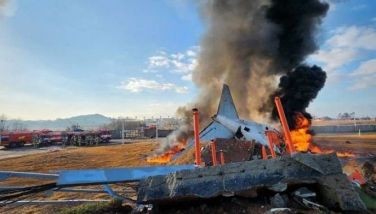Bombings in Iraq's capital kill at least 27 people
BAGHDAD — A series of bombings, including three over a span of less than 10 minutes, killed at least 27 people across Baghdad on yesterday, shaking the fragile sense of security the capital has maintained despite the Sunni militant offensive raging across northern and western Iraq.
Meanwhile in the northern city of Sulaimaniyah, Iraq's ailing president returned to the country after more than 18 months abroad for medical treatment following a stroke in late 2012, state TV said. Jalal Talabani is wrapping up his second consecutive term as president, and is not eligible to run again.
yesterday's attacks in Baghdad are among the most significant in the capital since insurgents led by the Islamic State extremist group captured Iraq's second-largest city Mosul last month at the start of its blitz. After Mosul's fall, the government moved aggressively to try to secure Baghdad amid fears it might fall as well, and the city has seen few major attacks in recent weeks.
yesterday's deadliest bombing took place in the Shiite neighborhood of Abu Dashir, where a suicide attacker rammed a car packed with explosives into a checkpoint, killing at least nine people and wounding 19, officials said. Four policemen were among the dead, a police officer said.
Later in the day, three car bombs in different neighborhoods of Baghdad went off in less than 10 minutes, hitting the districts of Baiyaa, Jihad and Khazimiyah. The attacks killed at least 15 people and wounded another 42, police officials said.
Another car bomb near a bus stop in Khazimiyah killed three people and wounded 15, police said.
Hospital officials in Baghdad confirmed the casualty figures in all of the attacks.
The officials spoke on condition of anonymity because they were not authorized to brief journalists.
The Sunni militant blitz, led by the Islamic State extremist group, has pushed into areas west of Baghdad, and also has established a presence in a belt of Sunni areas running south and north of the capital. Baghdad itself has a predominantly Shiite population.
The Iraqi military launched a counteroffensive late last month to try to dislodge insurgents from the city of Tikrit, some 130 kilometers (80 miles) north of Baghdad. That effort has sputtered, but has managed to secure much of the highway between Tikrit and the city of Samarra, home to one of the most important Shiite shrines. Tikrit itself remains in militant hands.
Northwest of the city, heavy fighting has raged around an air base that previously served as a US military facility known as Camp Speicher.
On yesterday, Iraqi military spokesman Lt. Gen. Qassim al-Moussawi denied reports that militants had captured Camp Speicher, saying government troops repelled an attack on Friday and the base remains fully in government hands.
Three security officials confirmed that the militants launched an assault on the air field late Thursday, blasting through an outside wall of the base and destroying one helicopter. One of the officials said the other helicopters at Speicher were "evacuated" from the base to prevent them from being damaged, but they have since been returned to duty.
The officials spoke on condition of anonymity because they were not authorized to brief the media.
A resident of Tikrit, Ahmed Jassim, said by telephone that clashes were taking place around Speicher on yesterday, but "the gunmen are outside the camp." The center of Tikrit is still under insurgent control, and is being shelled by the Iraqi military, he said.
Iraq's president, Talabani, arrived in the far northern city of Sulaimaniyah in the largely autonomous Kurdish region early yesterday evening, state television said.
Talabani, who himself is Kurdish, suffered a stroke in late 2012. He was flown to Germany shortly afterwards for treatment and rehabilitation.
With Talabani's term set to expire, Iraqi political leaders are in talks to decide on a new president as part of broader negotiations over forming a new government. Parliament is expected to meet Wednesday to discuss potential candidates.
Under an informal agreement that emerged after the 2003 US-led invasion, Iraq's president is a Kurd, the prime minister a Shiite, and the speaker of parliament a Sunni.
Two names have emerged as front-runners to succeed Talabani — former deputy prime minister Barham Saleh and the Kirkuk provincial governor Najimaldin Karim.
The Iraqi presidency is a largely ceremonial role, with the prime minister acting as the head of government. But Talabani has at times played an important role in mediating disputes among Iraq's ethnic and sectarian factions.
- Latest
- Trending

































